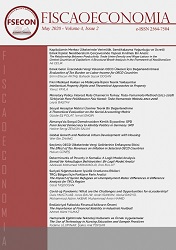Kapitalizmin Merkez Ülkelerinde Verimlilik, Sendikalaşma Yoğunluğu ve Ücretli Emek İlişkisi: Neoliberalizm Çerçevesinde Yapısal Kırılmalı Bir Analiz
The Relationship Between Productivity, Trade Union Density and Wage Labour in the Central Countries of Capitalism: A Structural Break Analysis in the Framework of Neoliberalism
Author(s): Ali ÇelikSubject(s): Supranational / Global Economy, Economic history, Political history, Labor relations, Economic policy, Government/Political systems, Political economy, Economic development, Human Resources in Economy
Published by: Ahmet Arif Eren
Keywords: Productivity; Trade Union Density; Wage Labor; Neoliberalism;
Summary/Abstract: Neoliberalism, is regarded as a combination of a series policies and strategies that put forward to overcome the structural crisis of 1973-74. The fact that capital developed new economic policies and production strategies to compensate for the declining profitability crisis of the 1970s is a result of its own condition of existence. The purpose of this study; to determine the extent to which the exit policies/strategies implemented under the name of neoliberalism affect working relations and living conditions of the working class. For this purpose; the effects of productivity and trade union density on labor income are investigated by using the data of 1970-2012 period for G-7 countries (Canada, Germany, Japan, Italy, France, England, USA) which are considered as the central countries of capitalism. In the empirical analysis; the unit root and cointegration tests which take into account the horizontal cross-sectional dependence were used. As a result of unit root test; the series becomes stable by taking the first differences. In the cointegration analysis considering structural breaks; the existence of the cointegration relationship between the series was accepted and the dates of structural breakage were consistent with the prior expectations. Finally, cointegration coefficients were estimated by CCE and CCMGE methods; ss a result of the analysis, it was seen that the increase in labor productivity had a negative effect on labor income. In the analysis which gives reliable results for the country units, this result is; It is statistically significant and interpretable for Italy, Japan and the United Kingdom. Throughout the panel, a linear relationship was found between trade union density and labor income. In other words, while the increases in the trade union density increase labor income; decreases in trade union density reduce labor income. However, this result is not statistically significant. In conclusion, this study presents empirical evidence on why capital wants to transform the working and living conditions of the working class as an exit strategy from the crisis.
Journal: Fiscaoeconomia
- Issue Year: 4/2020
- Issue No: 2
- Page Range: 216-240
- Page Count: 25
- Language: Turkish

